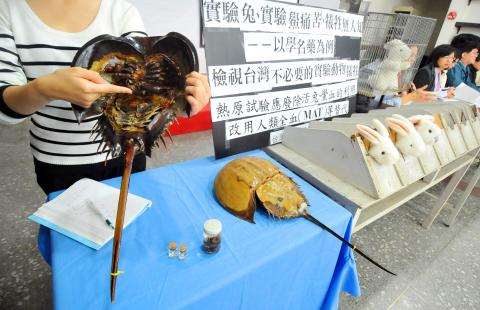Showing video clips of rabbits in tiny boxes and rows of horseshoe crabs having their blood drawn, representatives from an animal welfare group and legislators yesterday urged the government to amend regulations to reduce unnecessary animal testing for drug production.
After conducting an investigation of 25 local pharmaceutical companies between 2006 and this year, the Environment and Animal Society of Taiwan (EAST) said it found that all 25 firms did animal testing — 18 companies used rabbits for pyrogen testing, while seven companies used horseshoe crabs for Limulus amebocyte lysate (LAL) testing.
An EAST research member said that while animal testing is usually not required in the production of generic drugs — drugs for which the patent has expired and that can therefore be made by other pharmaceutical companies — pyrogen testing still uses animal subjects. Pyrogen testing is undertaken to detect if bacterial toxins are present in vaccines and medications that could cause fever in humans.

Photo: AFP / Mandy Cheng
Rabbits used for pyrogen testing are often locked in tiny boxes for more than three hours during the experiments, and liquids are intravenously injected into their ears to observe changes in their body temperature, she said.
Because rabbits are easily frightened, some die during the tests, while others are repeatedly subjected to abuse, she added.
EAST director Chen Yu-min (陳玉敏) said anxiety may cause the rabbits’ temperature to rise during the tests, and forcing them into a fixed position for hours may also cause their blood circulation to slow — both of which affect the accuracy of the tests.
The LAL testing method uses blood drawn from live horseshoe crabs, but the crabs grow very slowly, usually taking from 13 to 14 years to grow into full adulthood. Some researchers have suggested designating the crabs as a protected species, the EAST member said.
Because the crabs’ maximum tolerance to blood withdrawal is not known, many horseshoe crabs die when drained of too much blood during tests, she said, adding that death rates from these tests are between 10 percent and 20 percent.
Quoting Council of Agriculture statistics, the group said an estimated 19,500 rabbits have been used for pyrogen testing alone in the past 30 years, and that while rabbits have a life expectancy of about five to 10 years, many of the those in tests die in three to four years.
The group said the European Centre for the Validation of Alternative Methods has developed an alternative methods that are more effective for detecting pyrogen, such as the Monocyte Activation Test (MAT), which uses human blood.
Food and Drug Administration senior technical specialist Wang Der-yuan (王德原) said the agency is uncertain whether pyrogen testing can be fully replaced with MAT, but that it would add the method to the Chinese Pharmacopoeia.

A preclearance service to facilitate entry for people traveling to select airports in Japan would be available from Thursday next week to Feb. 25 at Taiwan Taoyuan International Airport, Taoyuan International Airport Corp (TIAC) said on Tuesday. The service was first made available to Taiwanese travelers throughout the winter vacation of 2024 and during the Lunar New Year holiday. In addition to flights to the Japanese cities of Hakodate, Asahikawa, Akita, Sendai, Niigata, Okayama, Takamatsu, Kumamoto and Kagoshima, the service would be available to travelers to Kobe and Oita. The service can be accessed by passengers of 15 flight routes operated by

GIVE AND TAKE: Blood demand continues to rise each year, while fewer young donors are available due to the nation’s falling birthrate, a doctor said Blood donors can redeem points earned from donations to obtain limited edition Formosan black bear travel mugs, the Kaohsiung Blood Center said yesterday, as it announced a goal of stocking 20,000 units of blood prior to the Lunar New Year. The last month of the lunar year is National Blood Donation Month, when local centers seek to stockpile blood for use during the Lunar New Year holiday. The blood demand in southern Taiwan — including Tainan and Kaohsiung, as well as Chiayi, Pingtung, Penghu and Taitung counties — is about 2,000 units per day, the center said. The donation campaign aims to boost

ENHANCING EFFICIENCY: The apron can accommodate 16 airplanes overnight at Taoyuan airport while work on the third runway continues, the transport minister said A new temporary overnight parking apron at Taiwan Taoyuan International Airport is to start operating on Friday next week to boost operational efficiency while the third runway is being constructed, the Ministry of Transportation and Communications said yesterday. The apron — one of the crucial projects in the construction of the third runway — can accommodate 16 aircraft overnight at the nation’s largest international airport, Minister of Transportation and Communications Chen Shih-kai (陳世凱) told reporters while inspecting the new facility yesterday morning. Aside from providing the airport operator with greater flexibility in aircraft parking during the third runway construction,

American climber Alex Honnold is to attempt a free climb of Taipei 101 today at 9am, with traffic closures around the skyscraper. To accommodate the climb attempt and filming, the Taipei Department of Transportation said traffic controls would be enforced around the Taipei 101 area. If weather conditions delay the climb, the restrictions would be pushed back to tomorrow. Traffic controls would be in place today from 7am to 11am around the Taipei 101 area, the department said. Songzhi Road would be fully closed in both directions between Songlian Road and Xinyi Road Sec 5, it said, adding that bidirectional traffic controls would